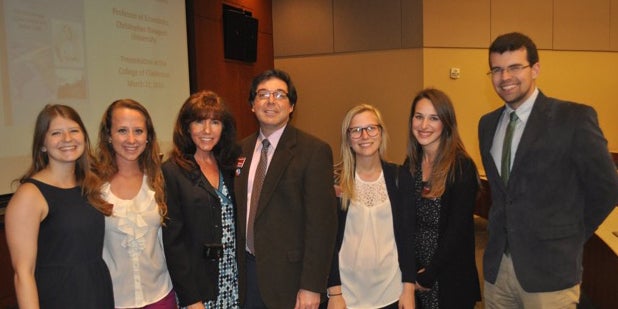What has the power to unite topics as disparate as literature, entrepreneurship, foreign intervention, democracy and voting behavior? Economics, of course. And what’s the best way to pool all of these subjects together? If you’re at the College of Charleston, it’s Adam Smith Week.

Jose Quisol (far left) and Frances Zeager (second from left), one of the Market Process Scholars, join other students and faculty for a discussion of Adam Smith’s ideas.
Each year, students and faculty members from the Department of Economics – under the aegis of the Center for Public Choice and Market Process – orchestrate a series of events in late March that created awareness about Adam Smith and his economic philosophy. This series includes lectures, presentations and panel discussions. For the past two years, students who are part of the Market Process Scholars program – a leadership development initiative for exceptional students – have been pivotal organizers for these events.
Mary Frances Zeager, a senior who added minors in Asian studies and math to her economics major, was one of the organizers. “Much of what we do as Market Process Scholars is prepare for visiting speakers,” she says, “and that includes the ones coming specifically for Adam Smith Week as well as those we have the rest of the year. We act as their hosts once they arrive and we liaise with them even before they get here. We also have the opportunity to introduce these scholars before their presentations and then eat dinner with them afterward, so we get to keep discussing their research. For me, it’s a great opportunity to learn more about the research process.”
An additional benefit of the scholars program, Zeager says, is getting involved with research across campus. “The work we do isn’t just limited to economics. As a Market Process Scholar, I have done research with faculty from a number of other departments, including political science and philosophy. It’s amazing how much that experience helped prepare me for the grad school application process.” (Zeager will be pursuing a master’s degree in data science at the University of Virginia next year.)
Senior Schylar Brock, an economics major with a minor in math, says she values the fact that the program directly connects Market Process Scholars with various professors and leaders of organizations and businesses throughout the year. “And,” adds Brock, “the semester-long Economics Book Colloquium gets all of us discussing relevant ideas and extends learning outside of the classroom. Some of the past topics have been the 2008 financial crisis, economic development in developing countries and the good and poor aspects of capitalism.”
[pullquote align=”left” cite=”” link=”” color=”” class=”” size=””]”Ultimately, I think I’ve learned how to better engage with faculty and fellow students on complex issues…”
— David Ahnen[/pullquote]
Another Market Process Scholar, David Ahnen, is a junior with a double major in economics and political science. “What I value,” explains Ahnen, “is the opportunity to be part of a humblingly intelligent group interested in similar issues and economic analysis. That’s been more than enlightening. Ultimately, I think I’ve learned how to better engage with faculty and fellow students on complex issues, and I’ve definitely gained a better appreciation for market’s role in a free society.”
Ahnen says he’d encourage any student interested in economics, philosophy, political science or history to attend the events put on by the Center for Public Choice and Market Process. “We have various speakers throughout the year who highlight the many weekend book discussions that our program sponsors. Students can also consider joining our semester-long Economics Book Colloquium. If you aren’t sick and tired of our group by then, you might consider applying to the scholars program when applications open up again next spring semester.”
For additional information, check out the College’s Center for Public Choice and Market Process.




